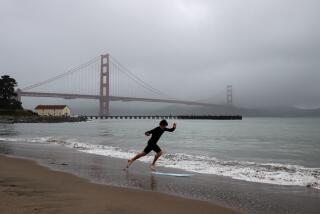Sierra Club Challenges Hawaii’s Tourism Plans
- Share via
HONOLULU — Most governments see tourism as a clean industry, a benign economic engine that produces a huge infusion of cash with little negative effect. In Hawaii, that conventional wisdom now is under attack.
The state this year is doubling the money it spends to lure visitors, to a whopping $55 million, as the islands emerge from a long economic slump.
But if the Sierra Club has its way, the ambitious marketing campaign could come to an abrupt halt. The environmental group has asked the Hawaii Supreme Court to stop the state from using public money to attract more tourists until their effect on the environment is formally assessed.
“No other state is spending this kind of money,” said Jeffrey Mikulina, director of the Sierra Club’s Hawaii chapter. “Nearly 7 million tourists descend on Hawaii’s beaches and roads and natural areas each year. Whether an extra million would be the straw that breaks the camel’s back needs to be examined.”
Initially dismissed as absurd by tourism advocates, the lawsuit gained some steam recently when the state Legislature defeated a bill that would have specifically exempted tourism marketing from the state’s environmental review laws. If the Sierra Club prevails in court as well, state-funded tourism promotion could be put on hold for months while an environmental assessment is conducted. That idea galls tourism officials, well aware that every third job in Hawaii depends on visitors.
“They want to stop the train and take a picture of where we’re going--and in that context, cease and desist the marketing of the state’s largest industry,” said Robert Fishman, chief executive of the Hawaii Tourism Authority. “That’s not enlightened administration. It’s . . . loony.”
The suit against the HTA has set off alarms on the mainland. Although the case relies on Hawaii law, tourism advocates fear it might encourage a broad interpretation of the National Environmental Policy Act, which governs public lands such as national parks and forests across the United States.
“We want to welcome more visitors, not treat them like polluters,” said Nevada Lt. Gov. Lorraine Hunt. “If the state of Hawaii loses this lawsuit, it could set a precedent for blocking other states from promoting tourism attractions.”
Among those groups opposing the suit are the Western States Tourism Policy Council, the American Hotel and Motel Assn. and the Travel Industry Assn. of America. It is unclear when the state Supreme Court will rule on the case.
The state of Hawaii argues that its environmental review law was intended to cover major building projects, not amorphous programs. Officials say that if an influx of tourists required the construction of more hotels, such projects would be reviewed for their environmental effects.
“We contend that the law is meant for site-specific development,” said Winfred Pong, the deputy attorney general handling the case. “Otherwise, every time the state spends money for anything--welfare, hiring people, whatever--we would have to do an environmental assessment.”
But the statute doesn’t specifically limit environmental reviews to physical projects. John Harrison, head of the University of Hawaii’s environmental center, called the Sierra Club’s move “an absolutely brilliant idea that is completely consistent with the law.” He said environmental assessments are conducted for major federal programs and should apply in this case.
“We have a very fragile island ecosystem,” he said. “It deserves and demands the most thoughtful consideration.”
The suit comes at a delicate time for Hawaii’s visitor industry. Slapped first by the U.S. recession and later by Asian economic woes, Hawaii’s tourism business stumbled through the last decade and began to recover only last year. It still falls slightly short of the peak of 6.9 million tourist arrivals reached in 1990.
The Sierra Club contends the marketing effort could increase the daily visitor census by 15% by 2005.
“The notion of boundless growth needs to be examined,” Mikulina said. “Water and electricity usage, traffic impacts, crowded beaches, overused trails, alien species introduction . . . these are the types of potential impacts we want to look at and see if there are ways to mitigate them. In Hawaii, the environment is the economy. Ignorance-based planning is no way to sustain it.”
--- UNPUBLISHED NOTE ---
This story has been edited to reflect a correction to the original published text. The Sierra Club is no longer a nonprofit group; the group lost its nonprofit status many years ago due to its political lobbying.
--- END NOTE ---
More to Read
Sign up for Essential California
The most important California stories and recommendations in your inbox every morning.
You may occasionally receive promotional content from the Los Angeles Times.












